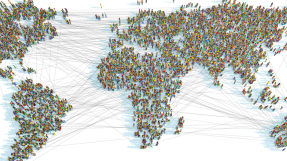
Every year it happens, round about this time. I hear Christians lamenting how 'Christmas comes earlier every year.'
The supermarkets, shops and garden centres are already boasting Christmas displays, seasonal books are being published, Christmas jumpers, socks and pyjamas are on sale, and the shelves are filling up with lots more Christmas products.
It used to be the clearing away of the Halloween merchandise that signaled, for me, the start of the peak Christmas selling season. This year, things seemed to have gone up a gear a bit earlier.
Am I annoyed or exasperated? Do I want to go around reminding people that 'it's not even Advent yet'?
This year, of all years, the answer from churches and Christians of all denominations must surely be no.
Because Christmas is that time of year when increasing numbers of people want to come to church services and share in the story of the new-born king. When carols are played in shopping malls, and there are openings to speak of the meaning of the season.
Churches might not be able to host big indoor carol services this year, but the challenge is how we can take the Christmas message out into the streets and neighbourhoods around our buildings.
This year has been one like no other for millions of people, with little prospect of better news into the new year. So we need to be declaring the Christmas message of hope and light and joy in the darkness. And to be doing so at every opportunity, starting now.
But also to be doing so with sensitivity and care for the many who will find it hard to be celebrating this pandemic year, and with the prospect of large family gatherings in doubt because of Covid-19 regulations.
The introduction to the Church of England's official liturgy for Advent – the period running up to Christmas – admits: "The anticipation of Christmas under commercial pressure has made it harder to sustain the appropriate sense of alert watchfulness."
Yes, it is important for us as Christians to explore Advent, to be waiting, expectantly for the new-born King, born as a baby, and to look ahead to his second coming, or advent, as judge at the end of time. To understand the richness and depth of the Advent and Christmas seasons.
Yet as people begin looking to Christmas for some light in the gloom of the pandemic – and hard-hit businesses desperately need to increase their income and chances of survival – it sounds a woefully wrong note if the Church is saying 'hold back, it's not time yet...'.
Archbishop of York Stephen Cottrell wrote in his 2009 book 'Do Nothing Christmas is Coming', "Christmas is one of the most joyful times of the year. It is also one of the most stressful. It is laden with expectations. It is often overtaken with grief. It might be the season of good will, but it can feel like the last straw on an already overburdened camel." He added ruefully, "Wise men would not ride this one."
Archbishop Cottrell is right that Christmas has to be approached sensitively, that we need to take care in how we celebrate, that for many people who have lost loved ones and livelihoods during this traumatic year, Christmas will not be easy.
We come alongside people with the news that the baby born in the manger grew up to be the Man of Sorrows, acquainted with grief, who experienced suffering and bereavement. God, born as Man, who shared our pain as well as our celebrations, ultimately died on a cross to rise again.
The increase in churches offering 'blue Christmas' services for people struggling with the seasonal jollity is a welcome sign of this growing sensitivity.
When the Church of England announced its 'Comfort and Joy' Christmas project, it said the campaign "holds together the hope that Christmas will bring joy and celebration after a uniquely difficult year."
The CofE acknowledged "for those who have lost loved ones or livelihoods, or who are potentially still not able to be together with loved ones, it may be the Church's role, both nationally and locally, to provide consolation, rather than assume everyone will be ready to join in jubilation."
The challenge for us Christians this year will be to promote a message of comfort, hope and joy in the likely midst of gloomy public health and economic predictions.
Our mission is to do this with love, humility and sensitivity to a hurting disorientated world – one that's eager for light in the gloom.
Rev Peter Crumpler is a Church of England priest in St Albans, Herts, a former Director of Communications with the CofE, and the author of 'Responding to Post-Truth' (Grove Books).













